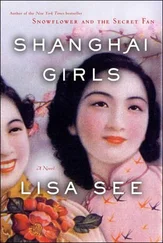Lisa See - Peony in Love
Здесь есть возможность читать онлайн «Lisa See - Peony in Love» весь текст электронной книги совершенно бесплатно (целиком полную версию без сокращений). В некоторых случаях можно слушать аудио, скачать через торрент в формате fb2 и присутствует краткое содержание. Жанр: Старинная литература, на английском языке. Описание произведения, (предисловие) а так же отзывы посетителей доступны на портале библиотеки ЛибКат.
- Название:Peony in Love
- Автор:
- Жанр:
- Год:неизвестен
- ISBN:нет данных
- Рейтинг книги:4 / 5. Голосов: 1
-
Избранное:Добавить в избранное
- Отзывы:
-
Ваша оценка:
- 80
- 1
- 2
- 3
- 4
- 5
Peony in Love: краткое содержание, описание и аннотация
Предлагаем к чтению аннотацию, описание, краткое содержание или предисловие (зависит от того, что написал сам автор книги «Peony in Love»). Если вы не нашли необходимую информацию о книге — напишите в комментариях, мы постараемся отыскать её.
Peony in Love — читать онлайн бесплатно полную книгу (весь текст) целиком
Ниже представлен текст книги, разбитый по страницам. Система сохранения места последней прочитанной страницы, позволяет с удобством читать онлайн бесплатно книгу «Peony in Love», без необходимости каждый раз заново искать на чём Вы остановились. Поставьте закладку, и сможете в любой момент перейти на страницу, на которой закончили чтение.
Интервал:
Закладка:
How these words echoed my own thoughts! I’d died young, but in my roaming I’d come to understand what it meant to be a wife and not just a girl dreaming alone in her room.
Tan Ze had styled her calligraphy after my own. How could she not when I’d guided her hand so often? I’d hoped that, seeing the writing came as if from a single hand, Ren would have understood that all the words were mine. I didn’t worry about that now. I wanted Yi to feel pride in what she was doing.
She wrote some more and then she signed her name. Signed her name!
I’d never done that. I’d never let Ze do that.
( 2 5 1 )
Over the coming months, Yi went daily to the Clouds Hall to add more comments to the margins. Slowly, something started to happen. I entered into a kind of dialogue with her. I whispered, and she wrote: The mournful chants of birds and insects, the soughing of the rain-lashed wind. The ghostliness one feels in the words and between the lines is overwhelming.
Once my thought was complete, she dipped the brush in the ink, and then added her own words:
Reading this alone on an overcast night is frightening.
She called upon her own experience when she wrote: Today, many fine marriages are delayed because people are picky on matters of family status and insist on amassing big dowries. When is this going to change?
How could she not understand that love—not money, status, or family connections—was what marriage should be about when she was living that herself ?
Sometimes to me her words were like flowers flowing off her brush: Mengmei changed his name because of a dream. Liniang fell sick because of her dream. Each had passion. Each had a dream. They both treated their dreams as real. A ghost is merely a dream and a dream is nothing but a ghost.
When I read this, I forgot my years of obsession and glowed with pride at Yi’s insights and persistence.
Yi responded to things I’d written and sometimes to things that had come from Ze’s brush. Along the way, I came to hear Ze in certain passages as clearly as if she were still with us. After all these years, I saw she’d contributed far more than I’d realized. Although Yi showed no inclination to join us in our lovesickness, it was as though she were summoning us.
And we answered with our thoughts, which she read on the page.
I rejoiced in Yi’s accomplishments and helped as best I could. At night, ( 2 5 2 )
when Yi stayed up reading, I brightened the candle flame so she wouldn’t strain her eyes. When her eyes got tired, I reminded her to pour a cup of green tea and hold it first over one eye and then the other, to refresh and soothe the redness. For every passage understood, every pastiche dismantled, every moment of affection deeply felt and written about, I rewarded my sister-wife. I kept her son safe when he wandered in the garden, preventing him from falling off the rockery, being bitten by insects, or escaping out the front gate. I warned the water spirits to make sure they didn’t trick him into drowning in the pond and the tree spirits not to let him trip over their roots.
I also began to change and protect the compound as a whole. When Ze was alive, almost all I’d known was the bedchamber. Back then, I’d compared the house unfavorably to the Chen Family Villa. But what I’d thought was beautiful in my family home was actually the coldness and distance caused by wealth—too many fingers, no privacy, no quiet, and all that gossiping, angling, and strategizing for position. This, however, was the home of a true artist. It was also the home of a woman writer. Gradually, Yi made the Clouds Hall into a room where she could find sanctuary from the demands of the household, write in peace, and invite her husband for quiet evenings. I did what I could to make it even more pleasant by sending the fragrance of jasmine through the window, breathing on the blue windowpanes to make them seem even cooler, and running my fingers along the tips of the flowers that bloomed in the garden so their ruffling petals dappled the walls with quivering shadows.
I made the natural world open and bend to me. I made my feelings known in the prolific blooming of the peonies in spring, hoping the Wu family would remember me in their beauty and scent; in the snow that fell on the trees in winter, the time of year I’d died; in the subtle breeze through the willows, which should have reminded Ren that to me he would be forever like Liu Mengmei; and in the heavy fruit that hung from the plum tree, for surely they appreciated the miracle of that. These were my gifts to Ren, Yi, and their son. A libation poured had to be repaid and honored.
one day as Yi was airing books in Ren’s library, some sheets of bamboo paper fell out of one of the volumes. Yi picked up the brittle and cracked sheets, and read aloud, “ I have learned to use the pattern of butterflies and flowers in my embroidery. . . . ”
( 2 5 3 )
I’d written the poem just before I died and had hidden it and the others in my father’s library. Bao had sold them to Ren as Ze lay dying.
My sister-wife read the other sheets, all yellowed and fragile with age.
She wept, and I thought about how long I’d been dead. The crumbling sheets reminded me that somewhere my body was decaying too.
She took the poems back to her writing table, where she read them again and again. That night she showed them to Ren.
“I think I understand Sister-wife Tong now. Oh, Husband, I read her words and feel I know her, but so much is missing.”
Ren, who’d had other concerns when he bought my poems from my adopted brother, read them now. They were girlish and immature, but his eyes filled and glistened as he remembered me.
“You would have liked her,” he said, which was as close as he’d ever come to admitting to someone that we’d met. I floated with the joy of that.
The next day, Yi transcribed my poems onto fresh paper, adding a few lines of her own to those that had flaked away. In this way, we became one.
As she was doing this, a book fell from the shelf, surprising us both. It lay splayed on the floor with papers spilling from it. Yi picked them up.
Here was the “real” story of the commentary that I’d forced Ze to write and that she’d torn out and hidden, only to be found and hidden again by Ren. These pieces of paper weren’t old or disintegrating or in fragments.
They still seemed new. When Yi gave them to Ren, my poems were forgotten as his grief swelled and spilled from his heart and eyes.
In that instant, I understood: I had to get my project published. The women writers who’d been collected two thousand years ago, the women writers my parents had gathered for our library, and the women of the Banana Garden Five were remembered and honored because their works had been published. I whispered my idea to Yi, and then I waited.
A few days later, she gathered up her wedding jewelry and folded it into a silk scarf. Then she went to Ren’s library, laid the scarf on the table, and waited for him to look up. When he did, he saw her heavyhearted look.
Concerned, he asked what the problem was and how he could help.
“Sister-wife Tong wrote a commentary about the first half of the opera and Sister-wife Ze wrote about the second. You gained a reputation because of their words. I know you tried to deny responsibility, but their names have remained hidden and forgotten nevertheless. If we don’t reveal the truth and make my sister-wives known to the public, won’t they feel unfulfilled in the afterworld?”
( 2 5 4 )
“What would you like me to do?” Ren asked cautiously.
“Give me permission to publish the completed commentary.”
Ren wasn’t as positive as I’d hoped he’d be. “That’s an expensive un -
Читать дальшеИнтервал:
Закладка:
Похожие книги на «Peony in Love»
Представляем Вашему вниманию похожие книги на «Peony in Love» списком для выбора. Мы отобрали схожую по названию и смыслу литературу в надежде предоставить читателям больше вариантов отыскать новые, интересные, ещё непрочитанные произведения.
Обсуждение, отзывы о книге «Peony in Love» и просто собственные мнения читателей. Оставьте ваши комментарии, напишите, что Вы думаете о произведении, его смысле или главных героях. Укажите что конкретно понравилось, а что нет, и почему Вы так считаете.












